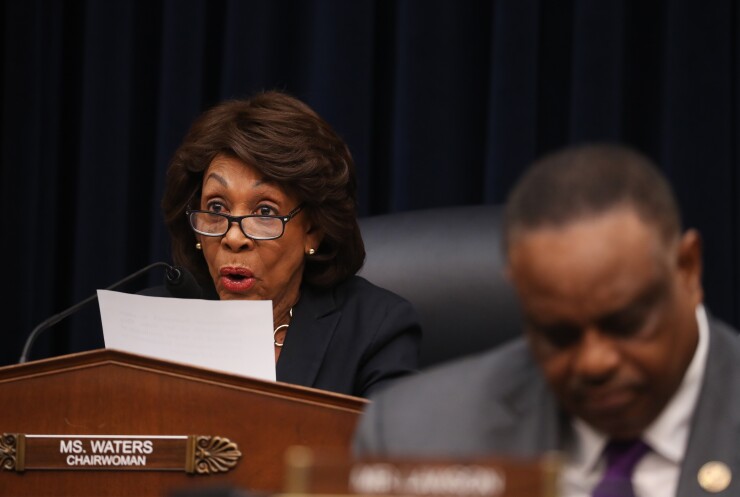After last year’s GOP-led repeal of regulatory guidance on auto lending discrimination, House Democrats sought Wednesday to reclaim the narrative, arguing that minority borrowers pay more because of pricing structures that give discretion to car dealers.
“Buying a car is a significant purchase for many Americans and should be a fair and transparent transaction, free of discrimination. Unfortunately, this is not the case for persons of color,” Rep. Maxine Waters, a California Democrat who chairs the House Financial Services Committee, said during a subcommittee hearing.
The hearing revived a policy fight that had been dormant since May 2018,

Five years earlier, the consumer bureau issued guidance that listed steps that auto lenders could take to limit their risk of being charged with violating fair lending laws. The guidance was part of a wider CFPB effort — which included stepped-up enforcement — to change how auto loans get priced.
Typically, auto dealers have the discretion to charge a higher interest rate than is authorized by the lenders that provide financing to their customers. If the dealer can convince the borrower to pay the higher rate, the dealer and the lender split the extra profit.
Under then-Director Richard Cordray, the CFPB pressured auto lenders —
The consumer bureau’s critics, who included auto dealers and lenders, as well as congressional Republicans, contended that the 2013 guidance was an effort to establish rules without seeking public comment. They also argued that the guidance would result in consumers paying higher prices for auto financing.
Congressional Democrats, who gained control of the House of Representatives in November, have little ability to influence priorities at the Trump-era CFPB. And while Wednesday’s hearing did not point to any actions that Democrats plan to take, it did provide a forum for witnesses who contend that discretionary pricing models result in discrimination.
“Dealers are understandably defensive when you point this out. And the fact that we see evidence of discrimination doesn’t mean that dealers are necessarily overtly wanting to discriminate,” said John Van Alst, an attorney at the National Consumer Law Center.
“But they have to quickly size up someone and decide how much they can push them. And what we see from the data is that what winds up happening is, they use race to decide how far they can push someone.”
Between 2013 and 2016, the CFPB entered into fair-lending consent agreements with Ally Financial, Fifth Third Bancorp and the auto-financing arms of Toyota and Honda.
But in December 2016, the CFPB signaled that it was no longer going to prioritize fair-lending enforcement in auto lending. And during the Trump administration, the agency has not brought any more such cases. In a recent speech, CFPB Director Kathy Kraninger
“We’re implicitly sending a green light to dealers and lenders across the country that this kind of discriminatory lending practice is OK,” lamented Kristen Clarke, executive director of the Lawyers’ Committee for Civil Rights Under Law, at Wednesday’s hearing.
The fair-lending cases that were previously brought against auto lenders relied on algorithms that looked at borrowers’ last names and addresses in an effort to determine their race. But North Carolina Rep. Patrick McHenry, who is the top Republican on the House Financial Services Committee, noted that this method often results in errors.
“I don’t have to look any further than my own community to see the failure of that practice,” he said, “seeing as there are two families McHenry in my hometown, and our race and ethnicity is different.”
Proponents of stricter enforcement of fair-lending laws agreed that better data is needed. Under federal law, lenders are prohibited from collecting information about the race of consumers who borrow money to buy a car.
“Without accurate and good data, we can’t know what’s going on,” Van Alst said.





